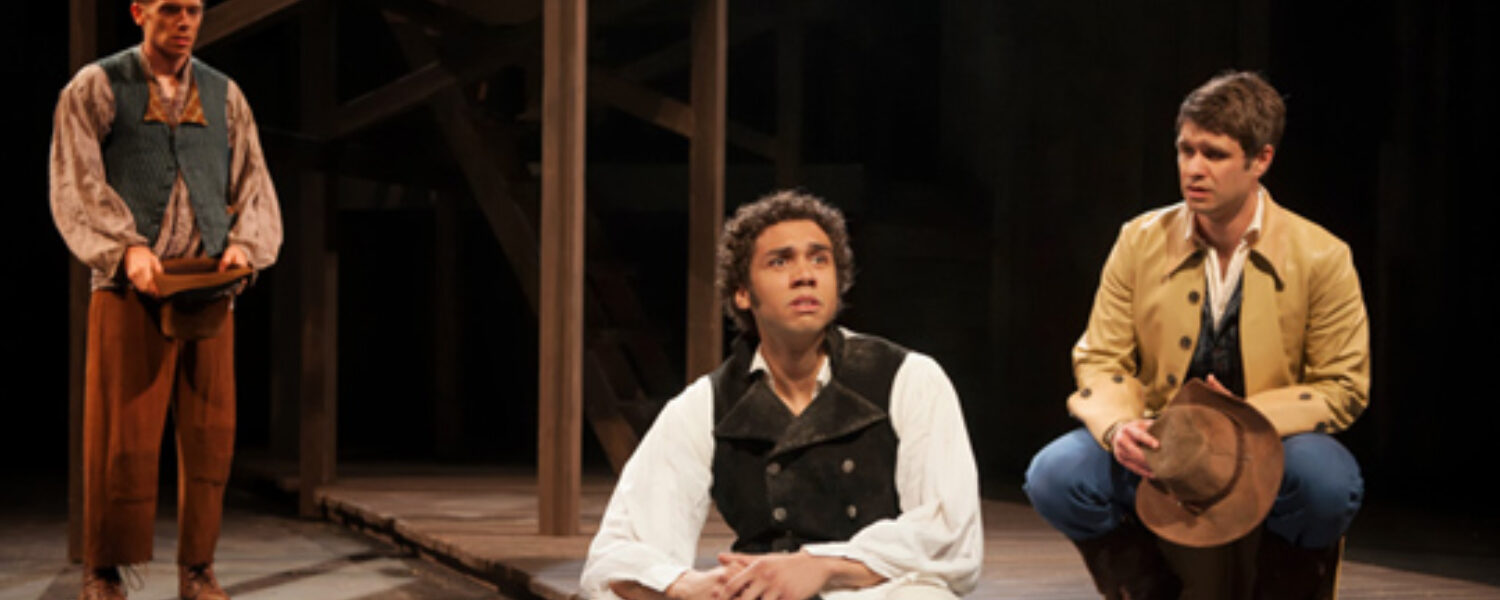
On the eve of the first night of rehearsals (for most of the plays, anyway), Two Gentlemen of Verona director Tim Ocel gave a short presentation to a small group on the Touchstone Theatre. Here's what he had to say.
I generally shy away from talking about a play that I'm still working on. At least the kind of 'what do you think this play means' questions that come up now and then - or a lot - in interviews before the play. I fear that if I name what the play is, that that's what the production is going to become. And knowing what the play is going to be isn't half as interesting as figuring it out with actors together in a rehearsal hall. There is nothing in the world as exciting as that. And this place? This place does it the best of any theater. The excitement of the rehearsal hall here and this company of actors, some new, some old every year. This is amazing.
I love William Shakespeare's plays. They interest me greatly. In one set of semantics that's what love is: having an interest; a want to interact with something or someone. To want to be inside it, to be intimate with them, to want to be allowed in. Now why do I love this play? I love this play because who these people are is of great interest to me. In Julia, Valentine, Proteus and Silvia I cannot think of four better examples of a current generation on the cusp. They are three parts constant, one part inconstant. And I like them. They breathe and teem with the curiosity and the brashness that is reflected in the personality of the plot, and in the dramaturgy of the play itself. The play's structure is abrupt and bumpy. The poetry is beautiful and soulful, but at time puzzling, weak and messy. The themes are simple and honest, but the characters are as complex as those in many of the later tragedies and romances. The Two Gentlemen of Verona tells of these four young people who celebrate the tragedy of lost innocence. Since they do survive it on some level, it's not the same kind of tragedy as Romeo and Juliet, but there are similarities.
This loss of innocence is a small but significant tragedy. It is a light bulb moment; a moment of realizing we were wrong about something very important to us. This moment is a part of growing up, maturing, coming into our own. It's necessary. But it's unfortunate, too. Love is often a part of it. So are attachment, intimacy, friendship. And for a time you find yourself in a kind of hellish shock, because you didn't see it coming and you had no idea you could be such a fool. It hurts with the realization of what hurt is. It thickens the skin for the very first time. What you do with that realization is the opening paragraph of your adult life. And this would be the final scene of Shakespeare's The Two Gentlemen of Verona, which is possibly Shakespeare's earliest scene of forgiveness and unqualified love. This is the scene that has puzzled scholars for years. But in a world that puts into conflict friendship and romantic love, what else can Valentine do? And in fact to forgive Proteus is what he does with his new found maturity and his constancy. One can only hope that Silvia understands the gesture.
Though the play may be about growth and the alteration that life experience brings, it also contains two important servants. Launce and Speed who never change because their job is to maintain. They are the constant world that comes round every twenty-four hours. There is also a dog, named Crab, to drive home the point that if dog is man's best friend, then people come in a pale second. And the reward of a slightly thicker skin is that the next time you are a fool (and it is going to happen again) it won't hurt quite so much-and in fact maybe you'll eventually come around to forgiving yourself for your very human failings and begin to heal.
We're setting our production in the late 18th, early 19th Century. It was a time of adventuring and travel and change. Travel is the all-embracing physical gesture of the play. People are constantly arriving or leaving. Starting new lives and leaving behind the old. Constancy is something that lives in the heart and the soul, not in the feet.
Nate's set, Devin's costumes, now being realized by Holly Payne, and Joe's music all support the abrupt nature of the play and the images of travel. The clothes and the music also support three divergent worlds, which are the upper and middle class world of Verona, the royal world of Milan and the wild forests of Mantua. We've been in rehearsal for two days already, dot, dot, dot, ellipse, ellipse, ellipse. Thank you.
